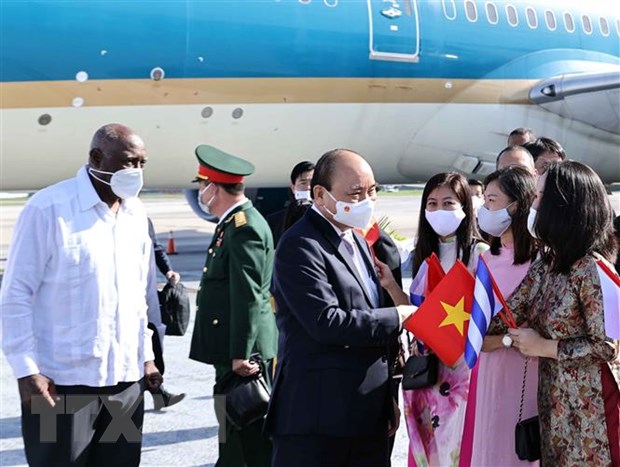Vietnamese President Nguyen Xuan Phuc delivered a statement at the general debate of the 76th session of the United Nations General Assembly (UNGA) in New York, the US, on September 22 (local time).
The following is the full text of the statement.
Mr. President,
I wish to extend my congratulations to Mr. Abdullah Shahid on the assumption of his duties as the President of the 76th UNGA. I am convinced that under his able leadership and with his vast experience, he will lead our session to success.
I highly appreciate the significant contributions of Mr. Volkan Bozkir in his capacity as the President of the 75th UNGA. I also wish to, once again, congratulate Mr. Antonio Guterres on his re-election as the UN Secretary-General. I believe that, with his perseverance and dedication,
he will work to realize the Organization’s directions and priorities in the years to come.
Mr. President,
The UNGA this year convenes against a unique backdrop, as the COVID-19 pandemic is jeopardizing the people’s lives worldwide. I believe that all our thoughts these days are with our countries and our people. And my heart yearns for my homeland Vietnam, where the entire nation is vigorously combating this pandemic to protect the health and lives of the people, to sustain economic growth and to ensure social security, leaving no one behind.
The pandemic has also exposed the shortcomings of the global governance system and the increasing inequality among nations.
Nonetheless, COVID-19 is not the sole challenge that we are facing today. Increasing tensions among major powers has led to a divisive and unstable international system. Wars are taking the lives of many innocent people. Disputes over territories and resources in many areas are on the verge of erupting. The rise of power politics, the disregard for international law, and the unilateral acts of coercion and hindrance against countries in exercising their legal rights are still taking place in many regions.
In that gloomy picture, what really motivates us are the strong desire for peace, cooperation and development among the people around the globe, and our recognition of the importance of international solidarity and multilateralism.
The United Nations - with its 75-year experience in preserving peace and nurturing friendly, just and equitable international relations - continues to assert its key role in the multilateral system. The Organization continues to effectively coordinate global efforts to respond to global challenges that cannot be resolved by any one country acting alone.
Against such backdrop, I fully support the theme proposed by Mr. President. And let me share some of my thoughts.
First, our most urgent task today is to expeditiously contain COVID-19 worldwide. The world cannot be safe if any single person or country still suffers from this pandemic. Vietnam values the role of UN agencies and other multilateral institutions, particularly the COVAX Facility in promoting fair and equitable access to COVID-19 vaccines and medications.
For the pandemic to be repelled, it is essential that we stand in solidarity, uphold a high sense of responsibility, and step up cooperation. Particularly, priority allocation of vaccines should be given to nations with a low vaccination rate. And developing countries should be enabled to engage in vaccine production and supply chains.
Second, the key solution to contain the pandemic and foster economic recovery lies in our ability to strengthen our own resilience, particularly in face of crises. But this does not mean that we have to do it alone. Resilience can only be sustained if it is based upon cooperation and connectivity among nations, particularly at a time when non-traditional security challenges do not know borders and can impact any nation.
We value the role played by the UN system and expect that it will continue to support member states’ efforts to build resilience, accommodating the interests and concerns of all countries.
Third, the challenges we face can be turned into development opportunities. As our daily lives as well as production and business activities have to undergo changes to adapt to the pandemic, this is an opportunity for digital transformation, utilization of novel technologies, and enhanced productivity, competitiveness and self-reliance of our economies.
The 2030 Agenda for Sustainable Development provides us with an excellent blueprint for seizing such opportunities, and calls for enhanced cooperation. We call upon all countries to fulfill their financing for development commitments, reschedule debt payments by developing countries, and provide these countries with necessary resources to contain COVID-19 and foster recovery, thereby turning opportunities into concrete development outcomes.
Fourth, cooperation in mitigating and preventing the dire impacts of climate change has become more crucial than ever before. Harsh weather conditions, sea level rise, environmental pollution, and biodiversity degradation are the cumulative consequences of decades of mankind’s reckless quest for development.
Those challenges are pushing us into acting promptly to safeguard our planet and realize the internationally agreed threshold of 1.5 degrees Celsius.
As we are heading toward COP-26, we need to make every effort to cut greenhouse gas emissions, in which developed countries should take the lead. Developing countries should receive further assistance in financing, technology transfer and capacity-building so as to reduce emissions, and enhance disaster prevention and mitigation in ways that foster transition towards green and circular economy. This is a shared opportunity for us to ensure the harmony between man and nature.
Fifth, the pre-requisite to fostering recovery and growth in the post-pandemic era is to sustain peace, security, and stability in each country, each region, and the world at large. Vietnam calls for a global ceasefire and an end to all violence to ensure the safety of civilians and facilitate humanitarian assistance in areas of conflicts.
Vietnam has undergone decades of wars to reclaim independence and national reunification, escape isolation and embargoes. We have made every effort to mobilize our internal strengths, uphold self-reliance, and adapt ourselves to the prevailing trends of our time to achieve our potential, international standing and prestige today.
We understand thoroughly the meaning of “nothing is more precious than independence and freedom,” and of peace and development of each nation. Vietnam condemns all acts of war and power politics, and violations of the fundamental principles of the UN Charter and international law.
More than ever before, all actors in international relations need to act in good faith and uphold responsibility, while avoiding tensions and confrontation. We should together strive to reshape international ties and build trust among countries on the basis of equality and cooperation. We must also respect the independence, sovereignty, territorial integrity, non-interference in the internal affairs of States, and resolve disputes by peaceful means.
At this august forum, we once again reaffirm our solidarity with the people of Cuba, and reiterate our strong call for a complete end to the unilateral embargoes against Cuba.
We hope that the situation in Afghanistan will soon stabilize for the Afghan people, particularly women and children, to be able to live in peace. We support the just struggle of the Palestinian people and the two-state solution towards the establishment of an independent Palestinian State living in peace alongside the State of Israel.
Mr. President,
After 35 years of Doi Moi, Vietnam has made historic accomplishments. We are aiming to become a high-income developed country by 2045, on the centenary anniversary of Vietnam’s independence.
The aspiration for a strong and prosperous Vietnam can only be realized when the country is truly a law-governed state of the people, for the people and by the people, and is able to invoke the patriotism, perseverance, great national solidarity and innovation of the entire nation.
Vietnam is pursuing a people-centered approach, and is striving to achieve social progress and equality, preserve cultural values, and protect the environment, while promoting sustainable and inclusive development. This is closely aligned with the SDGs that we endeavor to fulfill.
Vietnam has been pursuing a foreign policy of independence, self-reliance, peace, friendship, cooperation and development, and diversification and multilateralization of external relations. As a responsible member of the international community, Vietnam is proactively and actively engaged in extensive international integration, making responsible contributions to the concerted efforts of the international community.
Vietnam wholeheartedly support multilateralism, with the UN at the center, and international law as the foundation. We uphold the purposes and principles of the UN Charter, and endeavor to make substantial contributions to a more democratic and effective UN.
We will always remember and treasure the UN’s invaluable assistance accorded to Vietnam. The fruits of Vietnam’s reform and integration owe partly to the resources and policy advice the UN development system has been rendering to us over the years.
In the region, Vietnam is working closely with fellow ASEAN members to promote ASEAN centrality in the maintenance of peace, security and prosperity in Southeast Asia and the Asia-Pacific at large.
The ASEAN - UN relations has constantly been consolidated and developed, becoming a role model for cooperation between the UN and other regional organizations. We are making vigorous efforts to implement the Five-point Consensus endorsed by ASEAN Leaders to foster dialogue, reconciliation, and humanitarian assistance to the people of Myanmar.
Vietnam shares ASEAN’s position and the international community’s common voice on the importance of peace, stability, maritime security and safety, freedom of navigation and overflight in the South China Sea. We believe that all parties should refrain from unilateral actions that may further complicate the situation, resolve disputes and differences through peaceful means in line with the UN Charter and international law, particularly UNCLOS 1982. It is also necessary to fully observe the Declaration of Conduct by parties in the South China Sea, and soon achieve a substantial and effective Code of Conduct in line with international law, including UNCLOS 1982.
Mr. President,
On this momentous occasion, on behalf of the State and people of Vietnam, I sincerely thank all member countries for the trust placed in Vietnam in its capacity as a non-permanent member of the UNSC for the term 2020-2021. Over the past almost two years, Vietnam has always upheld the principle of “Partnership for sustainable peace.” We have promoted dialogue and cooperation, and actively joined the concerted efforts to prevent and address conflicts. Vietnam has advocated strengthening the upholding of the UN Charter and international law, bolstering cooperation with regional organizations, conflict prevention, mine action, and the protection of civilians and civilian critical infrastructure in armed conflicts.
The national flag of Vietnam is flying high at the UN Peacekeeping Missions in South Sudan and the Central African Republic, and it will soon be flying in other UN Missions as well. With our desire to make further contributions to the work at the UN, Vietnam is running for a seat at the Human Rights Council for the term 2023-2025, and at other important UN agencies. We look forward to the continued support from all countries in this endeavor.
Mr. President
The path ahead will not be easy. But I am convinced that the world people’s hearts will beat as one. Vietnam will work with countries and people around the world so that together we can prevail over the pandemic, and build a world of peace, prosperity and happiness for all. And this will be a glorious victory for us all.
Thank you./.

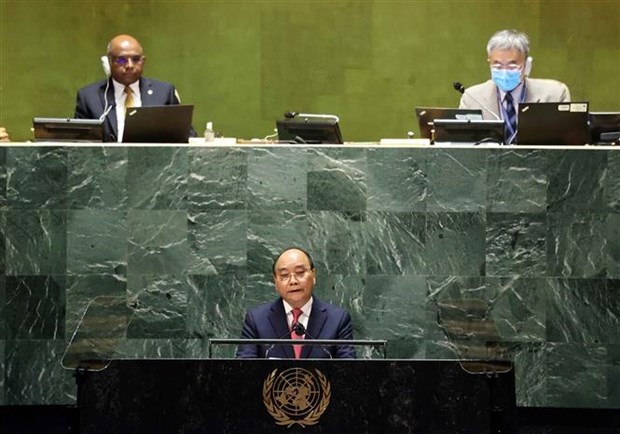
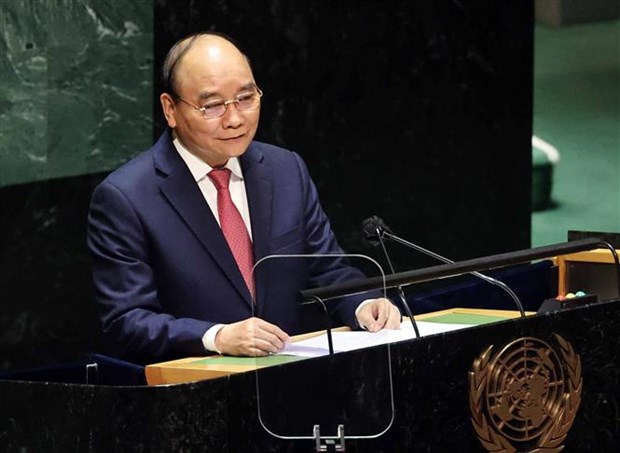


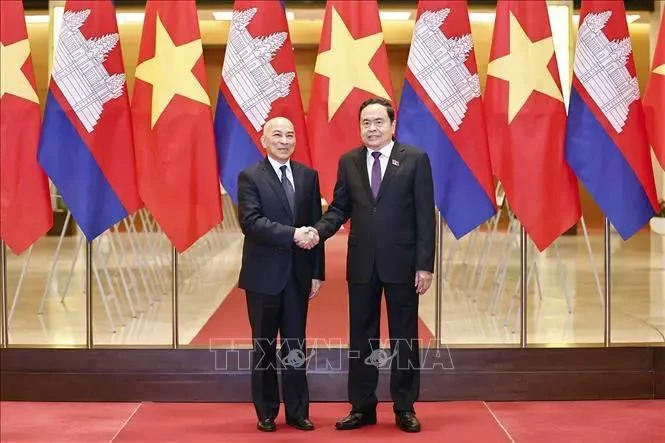
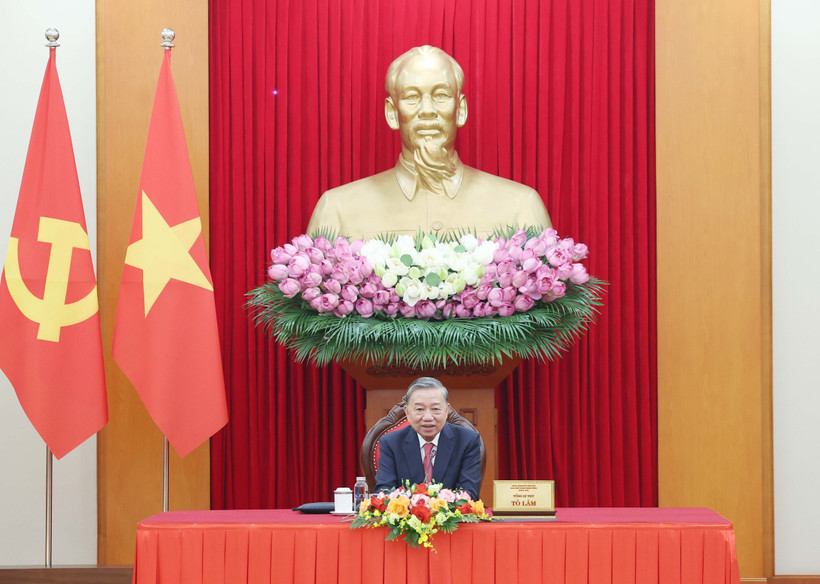

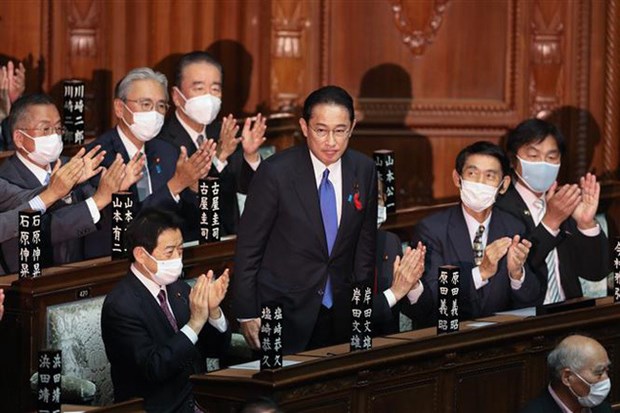
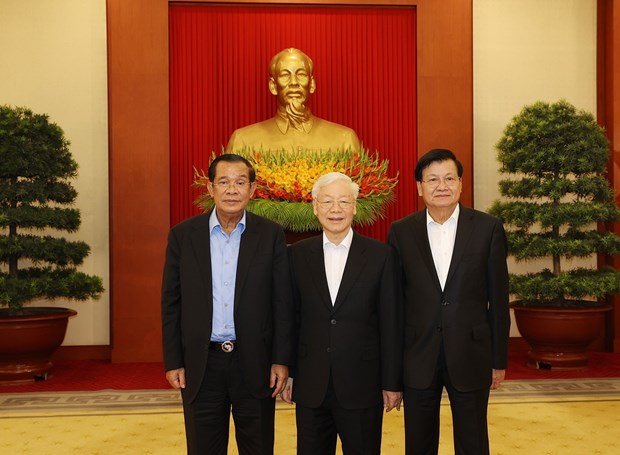
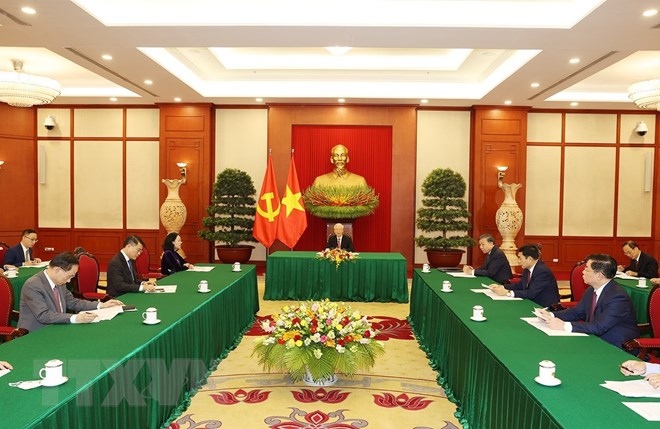
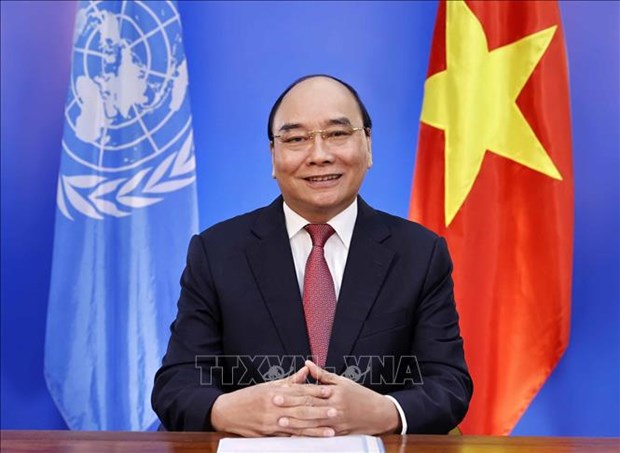
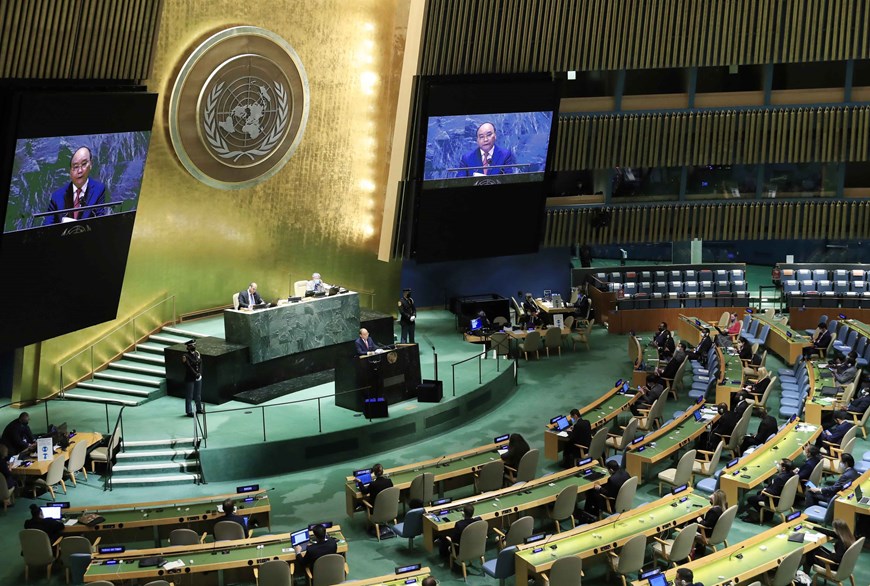
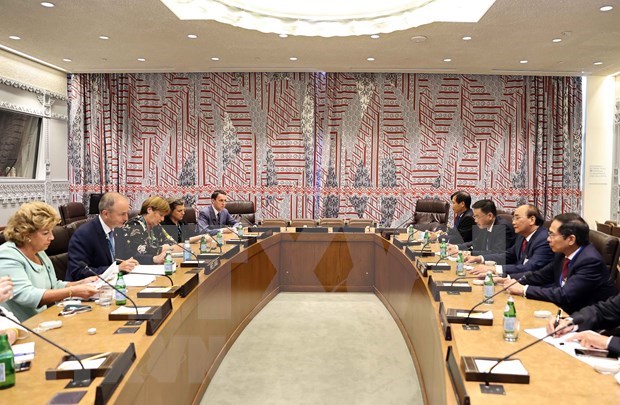
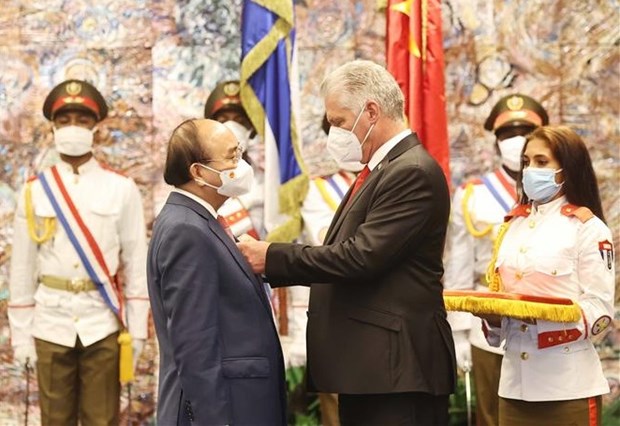
.jpg)
